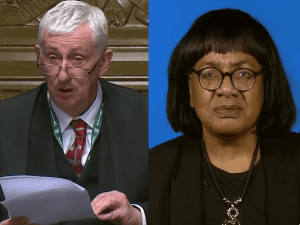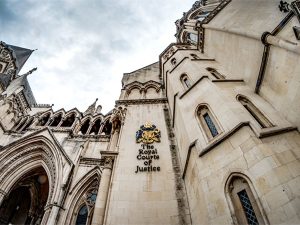The UK High Court has ruled that jailed publisher Julian Assange MAY be able to stop his extradition to the US – but only if judges think any assurances given by the US over free speech and the death penalty are NOT satisfactory. If the US assurances ARE satisfactory to the judges, then they have said that Assange’s team can make further submissions before a final ruling.
Assange: a three week window of time
On Tuesday 26 March the Wikileaks founder was in the High Court to hear the outcome of his February appeal hearing. This might have been his last chance to prevent the UK state extraditing him to the US.
Just after 10:30am, judges ruled that the US government has three weeks to give them ‘satisfactory assurances’ about free speech protections, and that he would not face the death penalty if convicted:
Julian Assange will not be extradited imediately. The High Court has given the United States three weeks to give satisfactory assurances. If those are not given, leave to appeal will be granted. If they are, there will be a further hearing in May.
— Joshua Rozenberg (@JoshuaRozenberg) March 26, 2024
Big crowd of #WikiLeaks Julian Assange supporters at High Court – but ruling on his extradition delayed as court asks for more assurances from US, including exclusion of death penalty and his right to argue freedom of speech defence. pic.twitter.com/cRC9MSIspk
— John Ray (@johnrayitv) March 26, 2024
This thread from journalist Charlie Moloney explains the situation well:
Also, a person’s extradition is barred if it appears that he might be prejudiced at his trial by reason of his nationality.
It is possible Assange will not be able to rely on the First Amendment because he is not a US citizen. Gordon D Kromberg, Assistant US Attorney, has said:
— Charlie Moloney (@CharlieMoloney) March 26, 2024
The judges in London said Assange had “a real prospect of success” on three of his nine grounds of appeal.
Victoria Sharp and Jeremy Johnson gave Washington three weeks to provide fresh assurances over concerns he will be prejudiced at trial because he is not an American citizen and that he could face the death penalty if convicted. The judges’ ruling stated:
Before making a final decision on the application for leave to appeal, we will give the respondent an opportunity to give assurances.
If assurances are not given then we will grant leave to appeal without a further hearing.
If assurances are given then we will give the parties an opportunity to make further submissions before we make a final decision.
The Canary has extensively documented Assange’s case. He has been confined in the high-security Belmarsh Prison since he was arrested on a US extradition request on 11 April 2019. Since then, it has become clear that his charges, his incarceration, and the US state’s attempted extradition of him amount to not only a witch hunt and human rights violations, but an attempt to set a precedent regarding the freedom of journalists and publishers.
Multiple twists and turns
Assange’s case has had multiple twists and turns:
- In 2017, US congressman Dana Rohrabacher met with the WikiLeaks founder in the Ecuadorian Embassy in London, to offer him a deal. Robinson was present at the meeting. Rohrabacher wanted Assange to provide evidence that Russia did not hack the Democratic National Committee emails. At the time, president Donald Trump was under investigation as part of the Mueller inquiry into alleged Russian interference in the 2016 election. Rohrabacher told Assange that if he agreed to provide the evidence, Trump would arrange a pardon or protection against extradition. But Assange was not prepared to name the source of the leak. An indictment followed.
- UN special rapporteur on torture Nils Melzer concluded in 2019 that Assange had been subjected to “torture”.
- .
- In January 2021, a judge ruled that Assange’s extradition was disallowed on health grounds and the risk that he could take his own life.
- Meanwhile, in October 2021 news emerged that the CIA planned to kidnap and kill Assange in London.
- In December 2021 the US appealed the extradition decision, offering an ‘assurance’ that, according to Assange’s lawyer, US authorities would not “place him under SAMs unless they decide he later deserves it”. The magistrate then ruled that the extradition could go ahead after all, once the home secretary approves it.
- In June 2022, then UK home secretary Priti Patel agreed that Assange could be extradited.
- Further appeals from Assange’s legal team followed – and failed.
- Of the 18 charges listed against Assange, one is simply about measures taken by any journalist to protect a source – in this instance Chelsea Manning. The other charges merely relate to receiving and publishing of information and so violate a journalist’s freedom of expression.
Now, Assange will once again have the chance to appeal the UK state’s verdict to extradite him.
As the Canary previously wrote:
This is not a case just about Assange. The freedom of every independent journalist and publisher who are brave enough to challenge corporate, capitalist, and colonial powers is at stake. To stay silent now is to mark your place on the wrong side of history.
Additional reporting via Agence France-Presse
Featured image via the Canary




